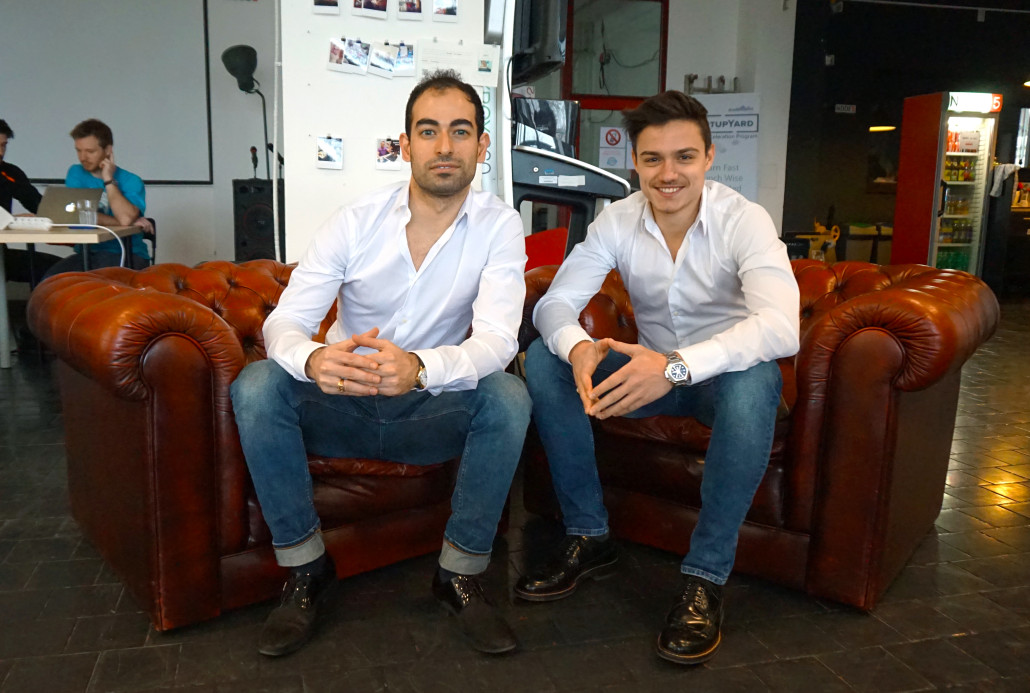Speedifly: When in Doubt, Travel!
SpeediFly is for spontaneous travelers who want to get away last minute, but don’t know where they can go on a budget.
Unlike clunky old-fashioned search engines, SpeediFly combines social dimensions like group travel planning, with the ability to discover destinations based on activities and interests. It will allow friends and relatives to book flights together at one price, while splitting the bill, and to book truly last minute trips, even on the way to airport.
I caught up with Co-Founders Alexander Karadjian and Stoyan Dobrev, the Bulgarian team behind Speedifly, to talk more about the young company that wants to take the next generation to the skies. Here’s what they had to say:
Q: Hi Alex and Stoyan, tell us a bit about yourselves and the SpeediFly Team.
Alex: Hi Lloyd. Thanks for asking. Well, I spent the last eight years of my life studying architecture at Harvard, and a month after graduation decided to found a spontaneous travel startup!
I think that speaks to my spontaneous nature. The truth is I have always been passionate for travel, which is why I took a semester off three times during these eight years and lived in Spain, the Netherlands, the Seychelles and Australia.
The other co-founders, Stoyan and Zahari, have been good friends of mine for many years. Actually, Stoyan dated my sister back in the day, and she always claims that she deserves a share in the company [smile].
Stoyan is also crazy about travel. He spent the last 4 years studying management in the UK and Hong Kong. Zahari is a friend from high school, whom I’ve known for more than 13 years. He is our tech genius living in his own world. In addition to his programming skills, he has quite a lot of experience with computer graphics and visual effects, which turned out to be invaluable for the team.
Q: How did you come up with the concept for SpeediFly?
Alex: The idea for SpeediFly came up during a lunch conversation I had with a good friend at Harvard.
At that time I was working on my graduate thesis project, a proposal for London`s seventh airport, and all that occupied my mind was optimization of air travel, airport capacities and cost of airfare. We were discussing how every fifth seat on a plane that left Heathrow airport was empty.
I though that the business case for last-minute travel had not been pushed to its limits – as long as people can be convinced to act spontaneously and hop on the next plane, the opportunity is huge.
Now, it’s no shock that this isn’t a new idea by any means, but I thought previous attempts had been missing something. There was a lot of talk about “Uber for air-travel,” because Uber is also about managing the extra capacity of someone’s car.
But airlines and air-travel just don’t work that way. It takes a different kind of approach: something in between traditional travel agencies, and these on-demand service platforms.
So we built the platform to essentially tap into the benefits of on-demand functionality, in what is otherwise a more traditional, less on-demand business.
Q: What do you see as the last-minute travel industry’s biggest problem? How can it be solved?
Alex: Travel platforms featuring last-minute travel “sell” the price. It’s always the price of the ticket, the price of the hotel, the price of the car you rent.
But if you think about the nature of a last-minute trip, it’s all about the experience – it’s about seizing the moment and allowing people to discover fabulous destinations and share their adventures with friends. The price should be there only to show people that travel is not as expensive as they think – that they can afford it; but low price is not the key factor that motivates people to travel.
With all the information in social media, it’s so easy to analyze your customer’s interests and passions, and to customize the last-minute deals to their taste. Still, nobody does it yet.
This is one way to go about it. Also, just think about how difficult it is to make a group last-minute booking – by the time you call your friends, the deal is gone. We want to provide our customers with a platform where they can share flight information with friends in-app, invite these friends to join them on a flight and make the decisions live.
That’s much easier for people, and it’s about the experience.
Q: What makes SpeediFly different from typical metasearch platforms like Kayak, or booking platforms like SkyPicker?
Stoyan: Metasearch platforms like Kayak or Skyscanner simply aggregate large amounts of flight data and refer customers to the websites of airlines or online travel agencies where tickets can be booked.
It`s not uncommon for the price and the seat availability to change during this referral process, which, of course, disrupts the quick and easy nature of the booking and negatively effects the whole user experience. That`s why we don`t want to follow the metasearch model.
By contrast, Skypicker processes bookings and does not redirect customers to third-party websites. In this context, we will be a booking platform just like Skypicker. In fact, Skypicker is our flight data provider.
What`s unique about Speedifly is that it allows for interest-based searches like flights to skiing, surfing, concert or festival destinations. Birdwatching is also an option, although I don`t have high hopes for that one [laughs]. So, in a way SpeediFly is a travel discovery platform – the customer doesn’t have to know where he or she wants go, just what he wants to do.
What`s more, SpeediFly is a social booking platform where users can invite their Facebook friends, build their own travel communities within our app, share flights they are interested in, or flights they have booked, and invite others to join them on these flights.
Once we start understanding what the customer’s and his friends` preferences are, we will be able to recommend group getaways based on interests and budget. SpeediFly is all about making travel a social experience.
Q: Let’s talk a bit about your target market. Who do you see as your ideal customer, and what does that person value most? What will be special to them about SpeediFly?
Stoyan: Our go-to-market strategy is to target Millennials. Statistics show that on average Millennials travel way more than any other age group. Soon, millennials will account for a substantial part of the working population in Europe, enjoying more purchasing power than ever before.
We divide our target market into two segments – students (aged 18 to 24) and young professionals (aged 25 to 35). These are two groups that differ in their price-sensitivity and flexibility.
Let`s start with the students. They are very price-sensitive but have flexible schedules, which means that it is easier for them to take a long weekend or to skip the Friday class and jump on the next available flight. With SpeediFly, students will not only find it easier to discover relevant and cheap flights, but we expect them to use extensively the social dimension of the platform – it will allow them to share their travel intentions, invite friends and classmates to particular trips and organize group getaways.
Young professionals are less price-sensitive and less flexible, which has two important implications. First, the cheapest option is not necessarily the best one. Second, the timing of the trip and its duration really matter. That`s why I see the value for this group coming from the recommended deals we can make. SpeediFly can save busy young professionals a lot of time planning a quick trip – with us they can discover destinations related to personal preferences for hobbies, concerts, sport events, etc.
Q: Can you talk more about your go-to-market strategy? When and where will people be able to use SpeediFly for the first time?
Stoyan: On the 27th of March we are soft launching in London. We will make the private beta of our app available to 200 students from two different London universities. We want to see how people interact with the app, how they make use of its social functionality and where they see the added value.
A month later, we will officially launch the app in London and market it exclusively to university students. For 4 months SpeediFly will be available only in London and in September we will release it in Paris, Rome, Madrid and Amsterdam.
Q: What are your near term goals for the service? Where do you hope to be in a year?
Stoyan: Up to 3 months after the official launch we plan to integrate accommodation and event ticket (concerts, exhibitions, etc.) APIs, which will complete the cycle of organizing a spontaneous trip – book a flight, find a place to stay, and discover something cool to do once you are there.
Our next priority will be to enable collective bookings. You know how when you are organizing a trip for many people, someone usually pays for all the flight tickets? This is because if you buy them separately, most probably each one will have a different price, if there are seats still available.
Then the person who has made the payment has to collect his money back – it`s an annoying process. We want to allow one person to start a booking and then split the payment among all travelers. Just like Uber does it. Why isn’t that functionality already available to air travelers? It should be.
In one year? Well, as with every B2C startup we want to be viral among our target customers and have more than 100,000 active users. We will need to work hard to get traction in Paris, Rome, Amsterdam, and Madrid. We’re looking forward to the challenge and the new experiences.
Q: Long term, travel is very competitive. How will SpeediFly compete and stay relevant in such a crowded market? What will SpeediFly be in 5 years?
Alex: Relevance is actually the key factor here. The industry is indeed competitive but one of its major problems is that it lacks relevance in terms of the deals offered to customers.
It’s not a working solution to send email updates about cheap flights from Paris to Tokyo to a customer who lives in London; recommending a skiing destination to somebody who is not into skiing also doesn’t work.
Still, people are constantly bombarded with such irrelevant offers, and at SpeediFly we want to fight against exactly this problem. Constant analysis of our customers is a priority for our team – this is how we can make relevant recommendations and stay competitive in this market.
In 5 years we want to have a global product or at least to have expanded beyond European borders. After Europe, our next target geography is Southeast Asia.
Q: In what ways has the concept of SpeediFly changed since you’ve joined StartupYard?
Stoyan: The first thing that pops in my mind is that we changed our name. (laughs) It was quite a contentious process at times. Now we are SpeediFly, and quite happy with that.
It is hard for me to express in a few words how much feedback and insight we were given for the last two months at StartupYard. Naturally, our concept changed substantially.
When we came to StartupYard, we did not even have a website. We had our core functionality – the 15 cheapest flights from the nearest airport within the following 10 days – and we thought we would be making money from selling cheap flights. In a sense, SpeediFly had a lot in common with any other online travel agency that sells cheap flights.
Now, after two months of mentoring and workshops, our ambition is to go way beyond the cost-saving concept. In fact, we realized that the full potential of the idea has little to do with cost-saving. It has a lot to do with social travel or collective travel.
If we go back to the basics of travel for a second, it is about experience, about the unknown and about the adventure. Unfortunately, if you go to the websites of our competitors, travel is all about price. We want to change that perception and at StartupYard many mentors helped us focus exactly on this. We want to escape from the cost-saving notion, create the largest community of spontaneous travelers and change the way people think about leisure travel.
Q: Are there any particular mentors from StartupYard who have had an especially big impact on the company’s development? How so?
Alex: You Lloyd, along with Cedric, have had an invaluable impact on our team. Sometimes, we take it for granted as we are together every day, all day long, but whether it’s for the landing page, for A/B testing or for fundraising campaigns, you have always been available to work with us.
Michal Jelinek and Wallace Green have been instrumental in fine-tuning our concept – they pushed us a lot to make the most of all the social interaction that is part and parcel of every travel experience. Wallace is a great believer in what we do and he has spent hours and hours with us working on the functionality and the definition of the added value of our mobile app. His enthusiasm about SpeediFly is contagious and we are really grateful for his input.






